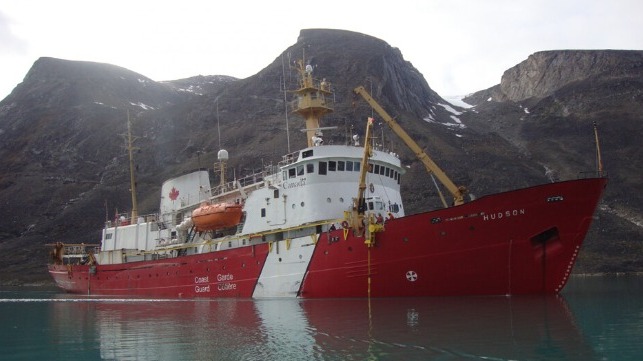Canadian Coast Guard Looks to Charter Interim Research Vessel

The Canadian Coast Guard has begun a search for a temporary replacement for its now retired Atlantic coast Offshore Oceanographic Science Vessel. According to a report from CBC, the government has already begun to charter vessels and is now developing a plan to meet its research needs after its oldest serving vessel, the 59-year-old CCGS Hudson, was forced into retirement by an engine failure in November 2021. A new vessel has been ordered for the Coast Guard but it is not expected to be delivered until 2025, barring construction delays.
The report indicates that the Canadian Coast Guard earlier this year paid the U.S.-based Woods Hole Oceanographic Institution nearly $4 million for a short-term charter. The vessel was used to complete climate monitoring surveys originally planned for the Hudson. Further, CBC reports that another charter is expected again to fill in this fall for scheduled research projects.
The Canadian Coast Guard confirmed that it has issued a request for information. It is seeking a suitable vessel to conduct research for a five-year period between 2023 and 2026. They are also asking for a further option for a two-year extension of the charter. The vessel would be based on the Canadian Atlantic coast.
Experts pointed out to CBC that there may not be a suitable vessel available due to the specialized nature of the mission. They believe the Canadian Coast Guard made the request to explore its options for the interim period and develop contingency plans until its newly built vessel will be ready.
The problem came about after the Coast Guard determined it was no longer practical to further extend the service of the Hudson. She had undergone a life extension refit in 2019 that was expected to keep her in service until at least 2024. However, in January 2022 the Coast Guard reported that “Due to the scale of the problem and the time and cost to repair it, combined with the costs associated with an upcoming period of regulatory compliance work, it has been determined that the ship is beyond economical repair and further investment would not allow it to return to reliable service.”
The premature end to her planned career also called attention to Canada’s National Shipbuilding Strategy, which critics of the government say is years behind schedule and incurring massive cost overruns. Plans to replace the Hudson began in the early 2000s, but the order was not placed till February 2021. Despite reports that steel cutting is finally underway and long lead elements for the ship have been ordered, the project is already behind schedule. When the contract was announced they set a target date of 2024 for delivery, which has already slipped to 2025 and once the vessel is delivered it will require a period of time for commissioning before undertaking its first missions.

that matters most
Get the latest maritime news delivered to your inbox daily.
Faced with a shortage of icebreakers, the Canadian Coast Guard has turned to the secondhand market. In November 2021, it acquired its fourth icebreaker with this one being a commercial light icebreaker that will require a conversion before going on permanent assignment. The vessel was built in Romania and was coming from Turkmenistan. The Coast Guard previously acquired the three medium-sized icebreakers.
Canada is not alone in seeking charters to bridge delays in its shipbuilding program. Last month, the U.S. Coast Guard also released a request for information seeking to identify U.S.-built commercial icebreakers that might be available for purchase. Currently, with only one heavy icebreaker, the 46-year-old Polar Star, the U.S. Coast Guard reported it was looking for a second vessel that would be available starting in 2023 or 2024. The U.S. Coast Guard ordered two next-generation vessels from Halter Marine, but the project is also behind schedule in part delayed by the pandemic and also a complicated design process. The U.S. is not expecting its two vessels until 2025 and 2026.
